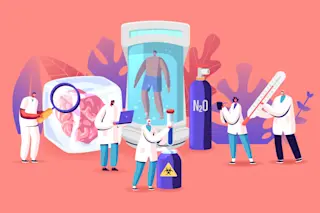As winter approaches, bears and other hibernators — from butterflies to box turtles — begin preparing to clock out until spring.
Us humans, on the other hand, find ourselves stuck all-too-consciously contemplating the frozen months ahead. In winter, everything feels twice as hard: getting dressed, shoveling snow, averting existential meltdown. Wouldn’t it be nice to ring in the new year, promptly tunnel down some dark burrow, and curl up to wait for better days?
There’s no clear path to human hibernation, or any guarantee that it’s possible. But researchers have begun to tease apart the science of the long nap, inspired by its potential to revolutionize space travel and medicine — and save us from the icy hell that is January.
Hibernation is a survival strategy used by certain animals during harsh winter conditions. Animals significantly reduce their metabolic activity and body temperature to conserve energy.
While the term "hibernation" ...















